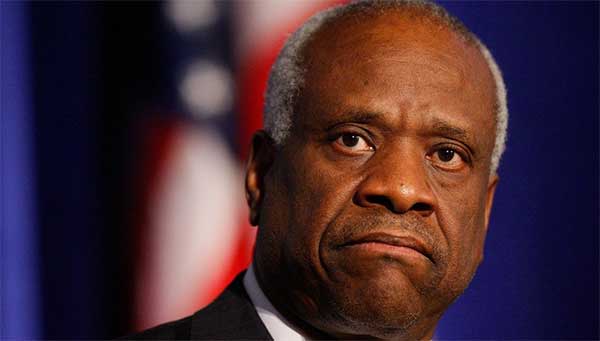

Washington, DC – -(Ammoland.com)- A case involving the scope of firearm prohibitions prompted Supreme Court Justice Clarence Thomas to break his more than decade-long silent streak on the bench.
Justice Thomas last asked a question in February 2006, but he made headlines on February 29th 2016 by asking a question during oral argument in the case of Voisine v. United States. Unfortunately, commentators seized on the fact that he spoke at all, rather than the troubling implications of what he had to say.
The Voisine case arises out of the prohibition in the Gun Control Act, 18 U.S.C. §922(g)(9), which prohibits those convicted of a “misdemeanor crime of domestic violence,” as that offense is defined, from possession of firearms and ammunition.
The defendants in Voisine had been convicted of domestic violence under Maine’s simple assault statute, which defines “assault” as including “intentionally, knowingly, or recklessly caus[ing] bodily injury or offensive physical contact” to another person. Neither had used a firearm or weapon of any kind in committing the offense. The question before the Court is the scope of the federal definition and whether it extends to misdemeanors which include reckless conduct as well as more deliberate conduct where there is an intent to harm. (Under that formulation, for example, an individual who injures a family member while recklessly driving could commit a qualifying domestic violence offense, potentially resulting in a permanent ban on firearm possession.)
As Assistant U.S. Solicitor General Ilana Eisenstein was winding up her argument in support of the expansive interpretation, Justice Thomas interjected to ask that she identify another “constitutional right that can be suspended based upon a misdemeanor violation of a State law.” While she struggled to conceive of a responsive example,
Justice Thomas persisted in his line of questions, noting, “[Y]ou’re saying that recklessness is sufficient to trigger a … misdemeanor violation of domestic conduct that results in a lifetime ban on possession of a gun, which, at least as of now, is still a constitutional right. At least as of now.”
Apart from being a stark reminder that the Court today is not what it was four weeks ago before Justice Antonin Scalia’s untimely death, this signals just how close the Court may be to undermining the Second Amendment interpretation offered in District of Columbia v. Heller in 2008. Only four of the current eight justices joined the late Justice Scalia’s majority opinion in Heller, recognizing that the Second Amendment protects a personal right to keep and bear arms for lawful purposes, most notably for self-defense within the home. Since then, several lower courts have chipped away at or ignored Heller’s fundamental premise.
Justice Thomas had previously warned of this slide towards what he called “relegating the Second Amendment to a second-class right,” in his dissent over the Supreme Court’s refusal to hear the “assault weapons” ban case, Friedman v. City of Highland Park. Joined by Justice Scalia, he observed that the “Court’s refusal to review a decision that flouts two of our Second Amendment precedents stands in marked contrast to the Court’s willingness to summarily reverse courts that disregard our other constitutional decisions.”
As we pointed out in an earlier alert, given these numbers, “future appointments to the Court will determine whether Heller is overturned, limited to nothing more than the possession of a handgun for protection within the home, or expanded to expressly protect the right to keep and bear all arms that are necessary for the entire range of defensive purposes, as the Framers of the Bill of Rights intended.”
The decision in the Voisine case is pending. So is the future of the Second Amendment.
About:
Established in 1975, the Institute for Legislative Action (ILA) is the “lobbying” arm of the National Rifle Association of America. ILA is responsible for preserving the right of all law-abiding individuals in the legislative, political, and legal arenas, to purchase, possess and use firearms for legitimate purposes as guaranteed by the Second Amendment to the U.S. Constitution. Visit: www.nra.org

LITTLE KNOWN to those 99.999% of citizens in pot crazy Colorado is how even the ACCUSATION of any domestic situation is now treated. If so ACCUSED (that’s all-regardless of facts) one must turn in all firearms and ammo. (to law enforcement) within just two days or a felony arrest can result from that “violation”- and the goodies are held until after the hearing/trial or whatever and until full “innocence” is established. This law was quietly passed a couple of years under Colorado state democrat party control. This is what happens when an invasive species of liberals (socialists and worse) move… Read more »
Who needs a constitution? Government approval?
Jesus says: sell your clothes but be armed…. that’s all anyone needs……
He is above the us government in all areas…..
Maybe NRA-ILA will save us. After NRA doing NOTHING to promote concealed carry in Illinois for 40 years, SAF & attorney Alan Gura got a decent lead plaintiff in Otis McDonald. Richard Pearson at NRA state affiliate ISRA helped recruit Otis to sign for the lawsuit against the City of Chicago. Recruiting the son of a sharecropper made good blackface for ISRA, although most members are aging baby boomers from all-white small towns south of Joliet. NRA failed to support the McDonald suit, but when it became obvious Gura was going to take it to the Supreme Court, NRA barged… Read more »
If I understand the argument, the gun control attorney is saying that a simple case of domestic violence would keep a person from owning a gun. In some states, just spanking a misbehaving child can be considered domestic violence. That charge can be leveled for the act of just grabbing your spouses arm to keep him or her from hitting you or yelling at each other. As I read it that is how simple this ruling could be used.
A mere CHARGE does not mean anything. It has to be proven BEYOND A REASONABLE DOUBT in a court of law in order to become a CONVICTION.
You fail to understand how many domestic violence cases are prosecuted. The prosecuting attorney will often charge with a felony and offer to reduce it to a misdemeanor if the accused will plead guilty. Many are afraid to take it to a jury or don’t have the financial means to pay for it and do plead guilty. At the end of the day they are still permanently barred from owning firearms in the future because of a misdemeanor conviction.
Nope! You have the right to legal representation regardless of your financial status. And no one has to plea to any charge, and juries still have to convict on the basis of ‘beyond a reasonable doubt’. You struck out, 5th Disciple.